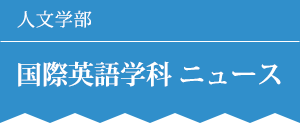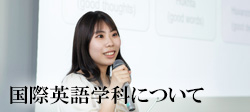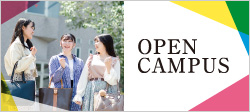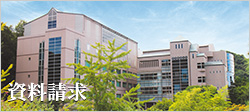Kokusai Eigo Gakka (KEG) has four years of seminar-style support for our students. Towards the end of the second year, students decide which Academic Research seminar they want to join. Students in the Eigo Bunka course who want to do all their 3rd- and 4th-year seminar classes in English often join John Herbert's seminar class.
(国際英語学科では、4年間を通して少人数のゼミ形式の授業で学生をしっかりサポートしています。学生たちは、3、4年次に「アカデミック・リサーチ」、通称ゼミに所属するため、2年次後期に所属先を決めます。英語文化コースでは、英語でゼミを受けようとチャレンジする学生たちがJohn Herbert教授のゼミを選択します。今回は、Herbertゼミの様子をご紹介します。)
The seminar is all about language and society. Students spend the first semester of the 3rd year discussing how themes such as age, gender, ethnic groups, and where you live affect the way we use language. Students also learn about different varieties of English in the world, bilingualism, the language on signs, and even endangered languages. We have a lot of fun, learn a lot, improve our English, and it is great to hear student ideas on our themes.
(ゼミのテーマは言語と社会です。3年次前期には、年齢、ジェンダー、民族、そして居住地が、我々の言語使用にどのような影響を与えるかといったテーマでディスカッションを行います。また、世界で話される様々な英語、バイリンガル問題、標識に使用される言語、さらには消滅危機言語についても取り上げます。こうしたテーマについて学生同士が意見を共有しながら、英語力を上げ、楽しんで学んでいます。)
Then it is time for students to make a choice! What theme do they want to research in detail for their graduation thesis?
(ゼミというのは、学生たちが自ら選択する機会です。実際に今学生たちがどのような卒業論文の研究をしているのか覗いてみましょう。)
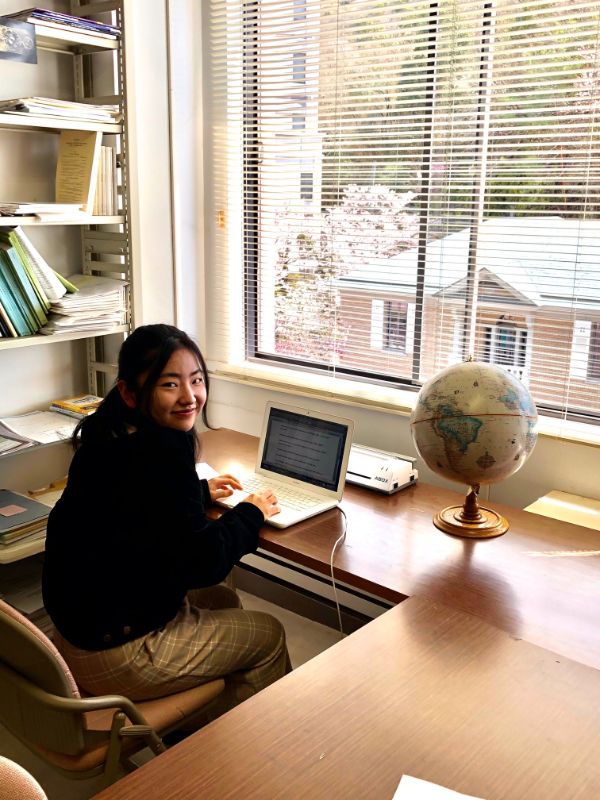
AN1 working on her thesis
Right now, students who are working on their graduation thesis are researching about the following themes:
(以下が、現在学生たちが取り組んでいる卒業研究のテーマです。)
- Gender and language(ジェンダーと言語)
- English language in Singapore(シンガポールにおける英語)
- English-Welsh bilingualism in Wales(ウェールズにおける英語とウェールズ語のバイリンガル問題)
- Comparison of messaging styles in English and Japanese(ソーシャルメディアにおける言語表現に関する英語と日本語の比較)
- Social dialect in "My Fair Lady"(『マイ・フェア・レディ』に見る社会方言)
- English language imperialism(英語による帝国主義)
- Evolving Australian English(オーストラリア英語の進化)
Why did students choose their themes? Each student has her own special interest and has found an area meaningful to them. For example, FW said that by studying about English in Singapore she "can gain a deeper understanding of Singapore's culture" and that "knowing Singapore gives you a deeper understanding of Asia as a whole."
(学生たちがこれらのテーマを選んだ理由は何でしょうか。それぞれが特に興味を持ち、そして自分にとって意義があると考えた分野を選んでいます。例えば、シンガポールにおける英語についてのリサーチに取り組む学生FWさんは、「シンガポール文化をより深く理解し、その理解によってアジア全体への理解も深まる」と言います。)
What are students' thoughts on an all-English seminar? FN and RN both say "it is so useful to improve my English", AN2 thinks it helps her "learn practical English skills" and AN1 "aspires to improve English skill quickly". Other students believe it helps their growth. MK2 says "it is not easy, but to get a lot of information in English enlarges my view" and FW says "it's difficult, but it's also a catalyst for me to grow." MK1 sums up the challenge by saying, "It is hard but it is fun and good for you if you like English."
(英語でゼミを行うことについてはどうでしょうか。「英語力のブラッシュ・アップにとても役立つ」(FNさん・RNさん)、「より実践的な英語のスキルが身につく」(AN2さん)、「もっと高い英語力を身につける必要があると感じる」(AN1さん)といったように、学生たちの英語力アップにつながっているようです。他にも、「簡単ではないけれど、英語で知識を得ることで視野が広がる」(MK2さん)、「難しい、でも成長するきっかけを与えてくれる」(FWさん)、「大変だけれど、英語が好きなら楽しさと面白さを感じられる」と、様々な成長を実感しているようです。)
The final aim of the seminar is to complete a graduation thesis in English. This is what the finished thesis looks like, together with books that helped research.
(ゼミでの研究の最終目標は、英語で卒業論文を完成させることです。以下は、これまでの卒業論文とその執筆に使用した文献の一例です。)
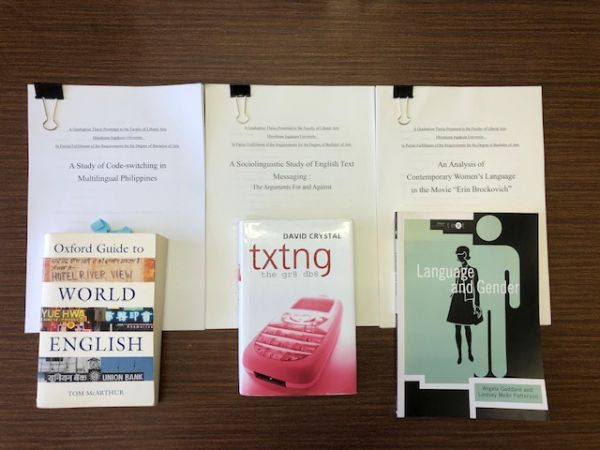
And, when it is all over, students can look back on two years of small-group study. English levels have risen, knowedge is gained, and students can graduate knowing they have accomplished something really worthwhile.
(学生たちはゼミでの学びを全て終え、2年間の少人数での学修を振り返る時、英語力が格段に上がり、知識を得て、そして自分たちが本当にやりがいのあることを達成できたことに気づくのです。この達成感を噛みしめながら卒業の日を迎えます。)
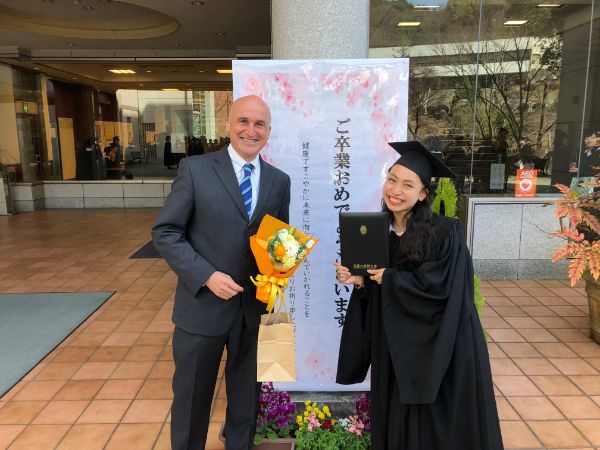
Successful thesis - successful graduation for MN.
